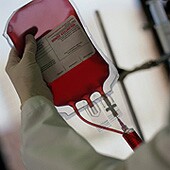Doctors need to be aware of the possibility of ‘passive transfer’
TUESDAY, April 7, 2015 (HealthDay News) — The case of an 8-year-old Canadian boy suggests that it’s possible, but still rare, for children to develop food allergies from blood transfusions. The report was published in the April 7 issue of CMAJ, the journal of the Canadian Medical Association.
The boy developed an allergy to fish and peanuts after receiving a transfusion from a donor with severe allergies to these foods, reports a team led by Julia Upton, M.D., of The Hospital for Sick Children in Toronto. He was treated promptly for the allergic reactions, and the allergies resolved within a few months, the researchers noted.
Upton’s team explains that blood donors with food allergies can transfer immunoglobulin E in blood products such as platelets. While rare, parents and doctors need to be aware of the possibility in case children who have received blood products suddenly develop allergies to foods they could safely eat before.
However, “people shouldn’t be overly concerned about passive transfer of allergy from blood products,” Upton stressed in a journal news release. “This condition has an excellent prognosis and typically resolves within a few months.”
Full Text (subscription or payment may be required)
Copyright © 2015 HealthDay. All rights reserved.








